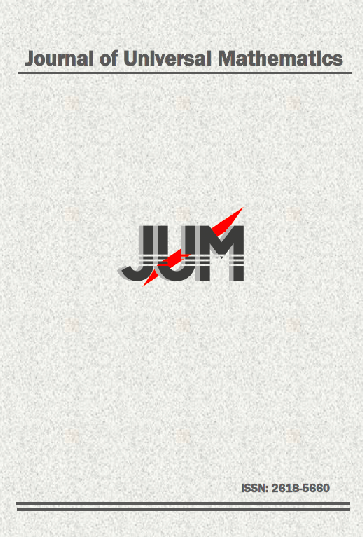NEAR APPROXIMATIONS IN VECTOR SPACES
NEAR APPROXIMATIONS IN VECTOR SPACES
Lower and upper approximations, Near sets, Near soft sets, Near soft vector space, Near subsets in the vector space Soft sets.,
___
- D. Molodtsov, Soft set theory first results, Comp. Math. Appl. 37 (1999) 19-31.
- H. Taşbozan, I. İcen, N. Bağırmaz, A.F. Ozcan, Soft sets and soft topology on nearness approximation spaces, Filomat. 31(13) (2017) 4117-4125.
- Z. Pawlak, Rough sets, Int. J. Comput. Inform. Sci. 11 (1982) 341{356.
- Z. Pawlak, Classification of Objects by means of Attributes, Institute for Computer Science, Polish Academy of Sciences, (1981) Report 429.
- J.F. Peters, Near sets, General theory about nearness of objects, Appl. Math. Sci. 1(53) (2007) 2029-2609.
- J.F. Peters, Near sets, Special theory about nearness of objects, Fundam. Inform. 75 (2007) 407-433.
- J.F. Peters, P. Wasilewsk, Foundations of near sets, Information Sciences. 179 (2009) 3091- 3109.
- J.F. Peters, Classification of perceptual objects by means of features, Int. J. Info. Technol. Intell. Comput. 3(2) (2008) 1-35.
- J.F. Peters, Fuzzy Sets, Near Sets, and Rough Sets for Your Computational Intelligence Toolbo, Foundations of Comput. Intel. 2 (2009) 3-25.
- J.F. Peters, R. Ramanna, Feature selection: a near set approach, (in: ECML and PKDD Workshop on Mining Complex Data, Warsaw, (2007) 1-12.
- J.F. Peters, S. Naimpally, Applications of near sets, Notices of the Amer. Math. Soc. 59(4) (2012) 536-542.
- J.F. Peters, S.K. Pal, Cantor, Fuzzy, Near, and Rough Sets in Image Analysis,CRC Pres ,Taylor and Francis Group, Boca Raton, U.S.A, (2010).
- T. Simsekler, S. Yuksel, Fuzzy soft topological spaces. Annals of Fuzzy Mathematics and Informatics, 5 (2013) 87-96.
- H. Aktas, N. Cagman, Soft sets and soft groups, Information Sciences, 177 (2007) 2726-2735.
- P.K Maji, R. Biswas, A.R. Roy, Soft set theory, Computers and Mathematics with Applications, 45 (2003) 555-562.
- F. Feng, C. Li, B. Davvaz, M.T. Ali, Soft sets combined with fuzzy sets and rough sets, Soft Comput., 14 (2010) 899-911.
- B. Davvaz, D.W. Setyawati, I. Mukhlash, Near approximations in rings. Applicable Algebra in Engineering, Communication and Computing, (2020) 1-21.
- B. Davvaz, Roughness in rings, Inform. Sci. 164 (2004) 147-163.
- C.Z. Wang, D.G. Chen, A short note on some properties of rough groups, Comput. Math. Appl. 59 (2010) 431-436.
- D. Miao, S. Han, D. Li, L. Sun, Rough Group, Rough Subgroup and Their Properties, D. Slkezak et al. (Eds.): RSFDGrC 2005, LNAI 3641, pp. 104{113, Springer-Verlag Berlin Heidelberg, (2005).
- N. Bağırmaz, A.F. Ozcan, Rough semigroups on approximation spaces, International Journal of Algebra, 9(7) (2015) 339-350.
- N. Bağırmaz, Near approximations in groups, AAECC, 30 (2019) 285-297.
- N. Kuroki, P.P. Wang, The lower and upper approximations in a fuzzy group, Information Sciences 90 (1996) 203-220.
- R. Biswas, S. Nanda, Rough groups and rough subgroups, Bull. Polish Acad. Sci. Math. 42 (1994) 251-254.
- M. Wu, X. Xie, C. Cao, Rough subset based on congruence in a vector space, IEEE, 2008.
- M. Wu, X. Xie, Roughness in vector spaces, IEEE, 2011.
- ISSN: 2618-5660
- Başlangıç: 2018
- Yayıncı: Gökhan ÇUVALCIOĞLU
NEAR APPROXIMATIONS IN VECTOR SPACES
GEOMETRY OF SEMI-INVARIANT COISOTROPIC SUBMANIFOLDS IN GOLDEN SEMI-RIEMANNIAN MANIFOLDS
Nergiz (ÖNEN) POYRAZ, Burçin DOĞAN
REMARKS ON THE ARITHMETICAL FUNCTION $a_{p}(n)$
APPLICATION OF KHARRAT-TOMA TRANSFORM FOR SOLVING LINEAR VOLTERRA INTEGRAL EQUATIONS
